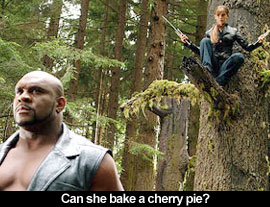Star Wars: Episode III – Revenge of the Sith (2005)
**/****
starring Ewan McGregor, Natalie Portman, Hayden Christensen, Ian McDiarmid
written and directed by George Lucas
by Walter Chaw SPOILER WARNING IN EFFECT. It's not quite as bad as Episode I or Episode II, which is to say that it's not uniquely bad, just run-of-the-mill bad. The dialogue, ghost-written by Tom Stoppard, isn't always unspeakable, and the performances of Hayden Christensen and Natalie Portman aren't nearly as wooden as they were the last time around. (Well, Christensen's isn't, anyway.) This lack of cheese presents its own set of problems, however, as Star Wars: Episode III – Revenge of the Sith (hereafter Episode III) is a lot like watching paint dry, with the manic light shows coming off at best as some slack particulate hustle. The picture's action sequences are chaotic, for sure, but just because everything is moving doesn't mean it's exciting, too. Though George Lucas may be a pretty good technician, he's still not a good director, and the pacing of Episode III is mortally, if predictably, off. Perhaps there's comfort in consistency.

 by Walter Chaw
by Walter Chaw